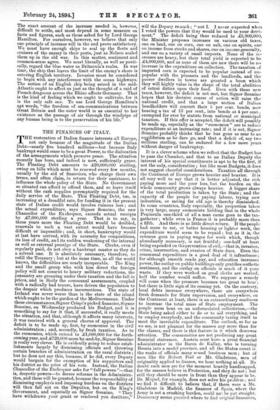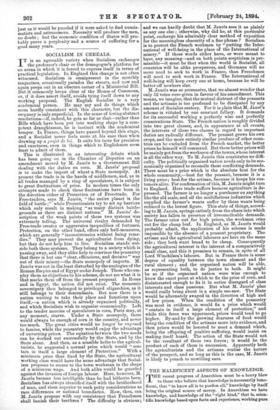THE FINANCES OF ITALY. T HE restoration of Italian finance interests
all Europe, not only because of the magnitude of the Italian Debt—nearly five hundred millions—but because Italy bankrupt would cease to be a great Power, to the dislocation of the arrangements which preserve peace. The situation recently has been, and indeed is now, sufficiently grave. The Floating Debt amounts to £20,000,000 sterling, owing on bills which must be renewed every few months, usually by the aid of financiers, who charge their own terms, and often claim, in return for their assistance, to influence the whole policy of the State. No Government so situated can afford to offend them, and so leave itself without the cash supplies peremptorily required for the daily service of the State. This Floating Debt, too, is increasing at a dreadful rate, for funding it in the present state of Italian credit would involve ruinous loss ; and the actual expenditure, says Signor Sonnino, the new Chancellor of the Exchequer, exceeds actual receipts by X7,000,000 sterling a year. That is to say, in three years more the Floating Debt would be doubled, renewals to such a vast extent would have become difficult or impossible ; and, in short, bankruptcy would at last have arrived, with its necessity for compositions, its loss of credit, and its sudden weakening of the internal as well as external prestige of the State. Clerks, even if regularly paid, do not obey a bankrupt master as they do a solvent one. It is absolutely necessary, therefore, to refill the Treasury ; but at the same time, as all the world knows, the difficulties are nearly insuperable. The King and the small group who with him direct the foreign policy will not consent to heavy military reductions, the peasantry are groaning under their taxation and the fall in prices, and in Sicily the communal assessments, coupled with a radically bad tenure, have driven the population to the despair which produces insurrections. The state of Ireland was never worse than is the state of the island which ought to be the garden of the Mediterranean. Under these circumstances, Signor Crispi's picked financier, Signor Sonnino, on Wednesday produced his Budget, and it is something to say for it that, if successful, it really meets the situation, and that, although it affects many interests, it was received with a general chorus of approval. The deficit is to be made up, first, by economies in the civil administration ; and, secondly, by fresh taxation. As to the economies, which extend to £1,080,000 for the forth- coming year, and £720,000 more by-and-by, Signor Sonnino is really very clever. He is evidently going to reduce estab- lishments largely by dismissing officials and throwing certain branches of administration on the rural districts ; but he does not say this, because, if he did, every Deputy would bargain for the exemption of his supporters and his district as the price of his vote. Instead, the Italian Chancellor of the Exchequer asks for " full powers "—that is, despotic powers—to decree reforms in the Administra- tion, and these will be granted, because the responsibility of dismissing employes and imposing burdens on the districts will then fall not on the Deputies, but on the King's Government, and especially on Signor Sonnino. " They have withdrawn your grant or rendered you destitute," will the Deputy remark ; "not L I never expected when I voted the powers that they would be used to your detri- ment." The deficit being thus reduced to £5.900,000, the Minister proposes increases on various old taxes, one on land, one on corn, one on salt, one on spirits, one on income from stocks and shares, one on income generally, and one on a variety of small imposts. None of the in- creases are heavy, but their total yield is expected to be £4,000,000, and as none of them are new there will be no increase in the expenditure on collection. The taxation of imported corn is expected to be popular instead of un- popular with the peasants and the landlords, and the poorer dwellers in towns are granted a boon which they will highly value in the shape of the total abolition of octroi duties upon their food. Even with these new taxes, however, the deficit is not met, but Signor Sonnino hopes that his decisive course of action will raise the national credit, and that a large section of Italian bondholders will convert their 5 per cent. bonds, now bearing a tax of 13 per cent., into bonds at 4 per cent., exempted for ever by statute from national or municipal taxation. If this offer is accepted, the deficit will possibly be made up, especially as the " economies " are to reduce expenditure at an increasing rate ; and if it is not, Signor Sonnino probably thinks that he has gone as near to an euilibrium as he dare go, and that a deficit of, say two millions sterling, can be endured for a few more years without danger of bankruptcy.
It is a clever scheme when we reflect that the Budget has to pass the Chamber, and that to an Italian Deputy the interest of his special constituents is apt to be the first, if not the only, consideration ; but like most Budgets, it does not suggest cheerful considerations. Taxation all through the Continent of Europe grows heavier and heavier. It is all very well to say that it is better adjusted, the rich paying more and the poor less, but the burden on the whole community grows always heavier. A bigger share of the total production is taken by the State ; and the capacity of the people for paying labour, trying new industries, or saving for old age is thereby diminished. In some countries, Italy especially, the proportion taken is very large, many economists holding that in the whole Peninsula one-third of all a man earns goes to the tax- gatherer ; while even in France it is probably more than a fifth. And there is so little direct return. If the people had more to eat, or better housing or lighter work, the expenditure would seem to be repaid ; but as it is, the revenue goes in paying wages for work which, though abundantly necessary, is not fruitful ; one-half at least being expended on the prevention of evil,—that is, invasion, crime, insurrection, and evasion of State dues. Even the communal expenditure is a good deal of it infructuose ; for although smooth roads pay, and education increases power, the outlay on public buildings only gratifies aesthetic sentiment, and the outlay on officials is much of it pure waste. If they were worked as good clerks are worked, half the number would suffice. We suppose a remedy will come when the pressure becomes too great to bear ; but there is little sign of its coming yet. On the contrary, local debts increase everywhere, there are everywhere fresh demands for State supervision, and everywhere, on the Continent at least, there is an extraordinary readiness to increase 1 he total mass of State employment. The people seem bent on an unformulated collectivism,—the State being asked either to do or to aid everything, and to employ everybody, and the community taxing itself to meet the inevitable expenditure. The outlook, so far as we see, is not pleasant for the masses any more than for the classes, and there is this feature in it which deserves attention. The communities are not producing any great financial statesmen. Austria must have a great financial administrator in the Baron de Kallay, who is turning Bosnia into a model province, and all the States count in the ranks of officials many sound business men ; but of men like Sir Robert Peel or Mr. Gladstone, men of originality applied to finance, we hear nothing at all No doubt such men are for the moment heavily handicapped, for the masses believe in Protection, and they do not ; but still they should be more in front than they appear to be. Dr. Miguel, for example, does not solve his problem ; and we find it difficult to believe that, if there were a Mr. Gladstone in Madrid, the finances of Spain, where the Army is not a crushing burden, could not-, be put straight. Democracy seems puzzled where to find original financiers, just as it would be puzzled if it were asked to find numis- matists and astronomers. Necessity will produce the men, no doubt ; but the economic condition of States will pro- bably prove a perplexity and a source of suffering for a good many years.



































 Previous page
Previous page